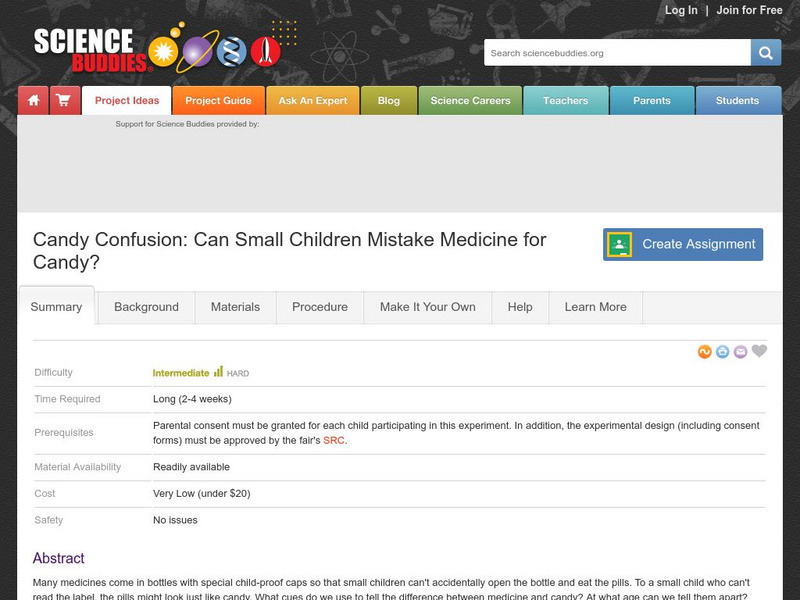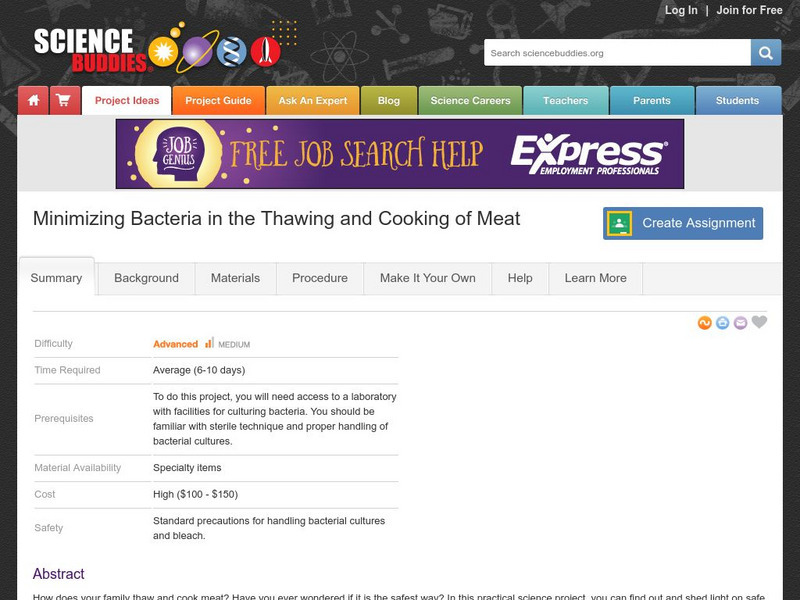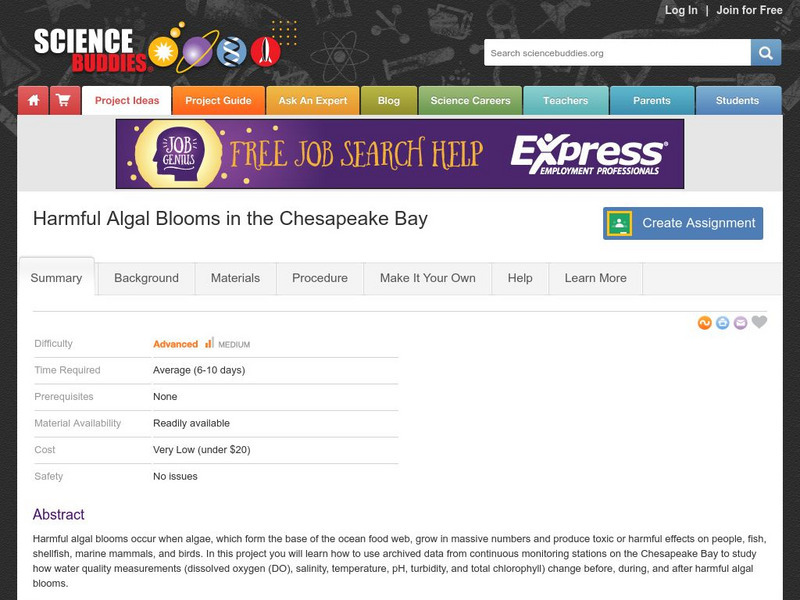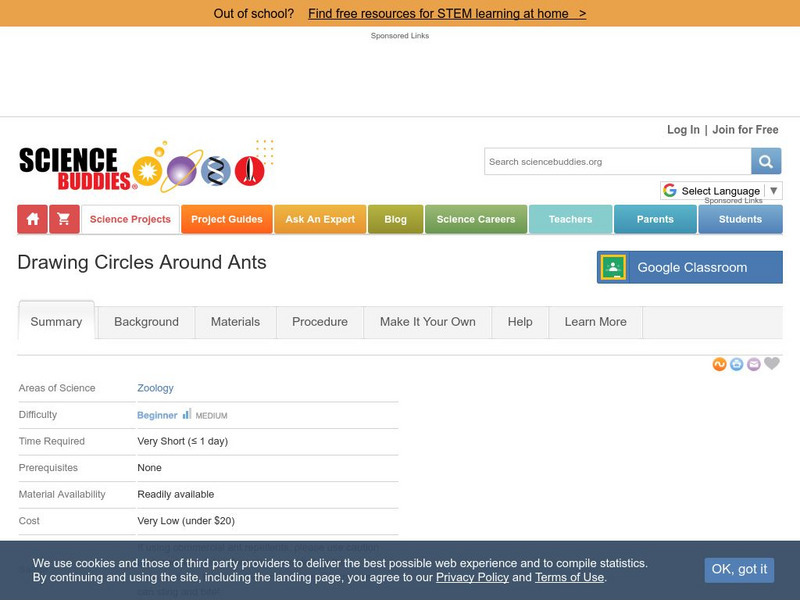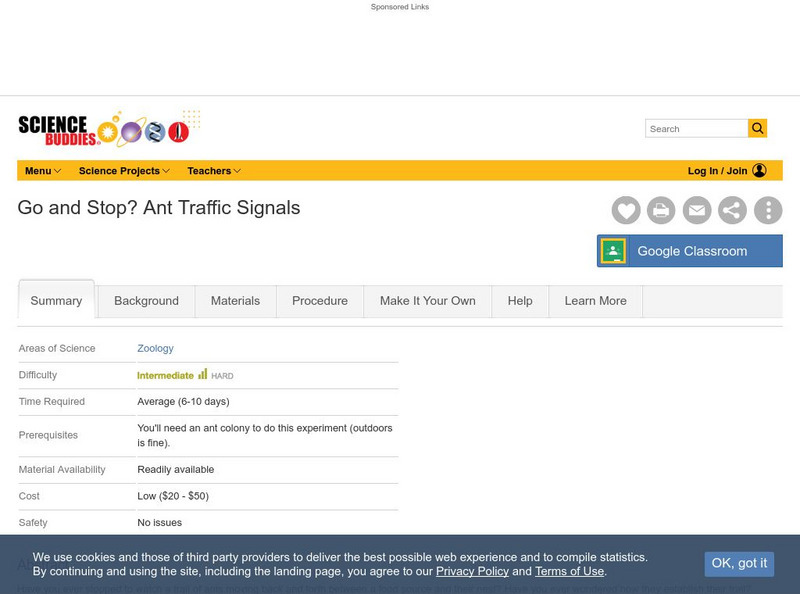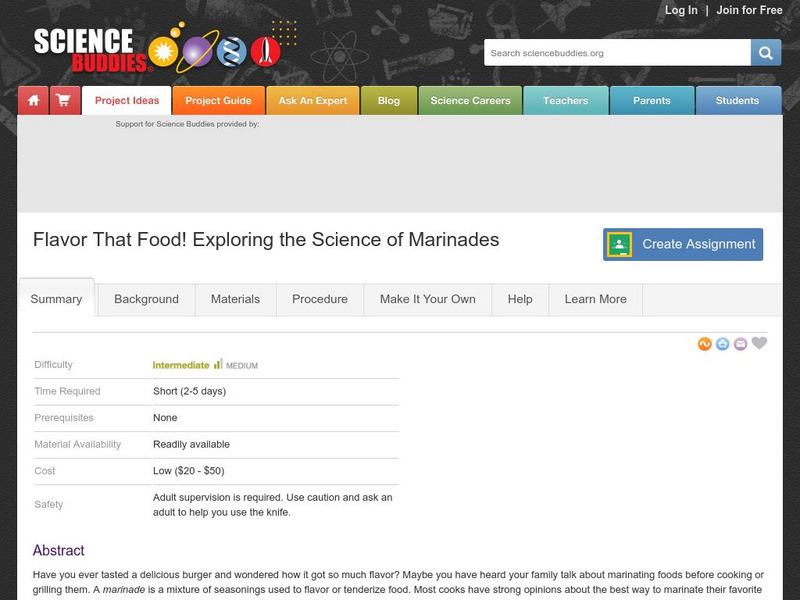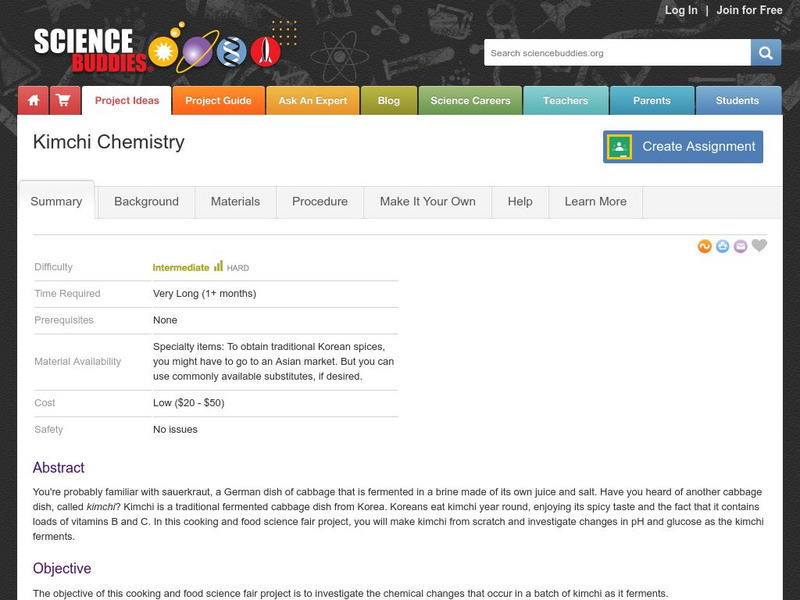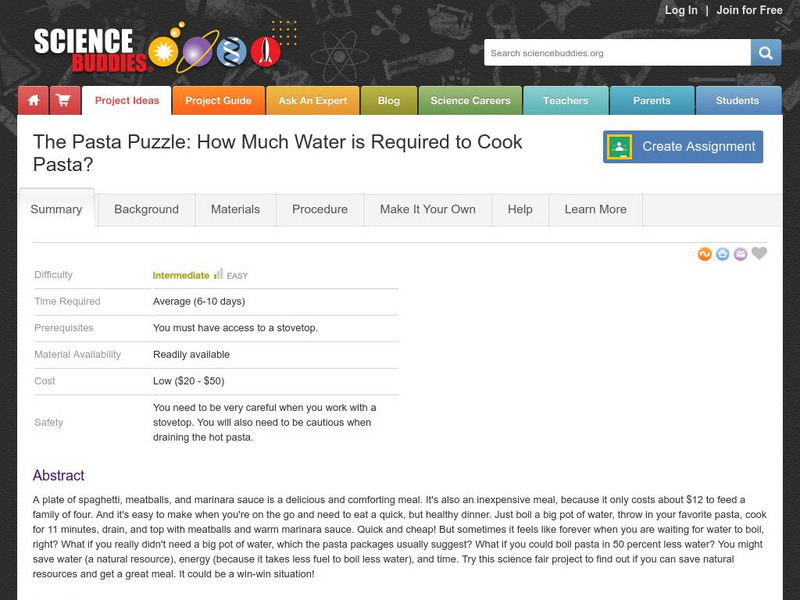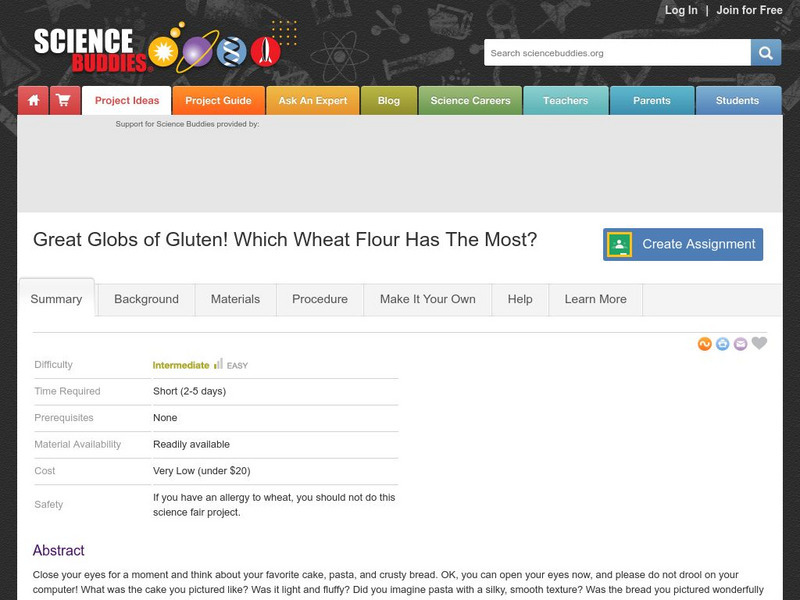Science Buddies
Science Buddies: Candy Confusion: Can Small Children Mistake Medicine for Candy?
Many medicines come in bottles with special child-proof caps so that small children can't accidentally open the bottle and eat the pills. To a small child who can't read the label, the pills might look just like candy. This project helps...
Science Buddies
Science Buddies: Minimizing Bacteria in the Thawing and Cooking of Meat
Here's a practical project that sheds light on safe practices in the kitchen. Use this information to determine which method of defrosting meat is safest and which method of cooking kills the most bacteria.
Science Buddies
Science Buddies: Project Ideas: Understanding How Food Becomes Rancid
In this cooking and food science fair project, the student will determine how light and air can oxidize fat in potato chips and cause the chips to go rancid. The Science Buddies project ideas are set up consistently beginning with an...
Science Buddies
Science Buddies: Effects of Food Preservatives on the Growth of Microorganisms
The problem of protecting food from spoilage has been with us since prehistoric times. The solutions to this problem have changed with advances in technology and knowledge about what causes food to spoil. This project uses liquid...
Science Buddies
Science Buddies: How Food Supplements Affect Weight Gain of Juvenile Mice
As your mom and dad always tell you, a healthy diet is important to good health. This project is designed to see what happens to mice when they are allowed to load up on sugary snacks. Do you think that they will gain excess weight? Do...
Science Buddies
Science Buddies: Mag Nificent Breakfast Cereal
You will devise a way of testing foods for supplemental iron additives in this experiment provided by Science Buddies. Then you will use your design to test different breakfast cereals to see how much iron they contain. The goal is to...
Science Buddies
Science Buddies: Harmful Algal Blooms in the Chesapeake Bay
Harmful algal blooms occur when algae, which form the base of the ocean food web, grow in massive numbers and produce toxic or harmful effects on people, fish, shellfish, marine mammals, and birds. In this project you will learn how to...
Science Buddies
Science Buddies: Do Oranges Lose or Gain Vitamin C After Being Picked?
Are oranges highest in vitamin C when they are fresh from the tree (or, in a pinch, the grocery shelf)? In this project you'll learn how to measure the amount of vitamin C in a solution using an iodine titration method.
Science Buddies
Science Buddies: Yeast Reproduction in Sugar Substitutes
There's nothing quite like the smell of fresh-baked bread to make your mouth water. As any baker can tell you, you can't bake bread without yeast. This project makes clever use of bread dough to measure yeast reproduction three different...
Science Buddies
Science Buddies: Where Do Lizards Go for Lunch?
You've probably heard about differences between the left brain and the right brain in people. One hypothesis has it that brain lateralization evolved as a survival mechanism in animals with eyes on the sides of their heads. One eye could...
Science Buddies
Science Buddies: Drawing Circles Around Ants
Do ants sometimes ruin your picnic? There are some chemical ant repellents you can spray to keep them away, but who wants to spray poison all over their food? In this experiment you can investigate some less toxic solutions that may be...
Science Buddies
Science Buddies: Leaves and Light
Leaves use sunlight to make food for the plant. Sunlight contains all of the colors of the rainbow, but are all of those colors used by the leaf? Can you find out if some colors of light are more important than others?
Science Buddies
Science Buddies: Go and Stop? Ant Traffic Signals
Have you ever stopped to watch a trail of ants moving back and forth between a food source and their nest? Have you ever wondered how they establish their trail? You've probably read that ants use chemical signals to communicate with one...
Science Buddies
Science Buddies: Flavor That Food! Exploring the Science of Marinades
Have you ever tasted a delicious burger and wondered how it got so much flavor? Maybe you've heard your family talk about marinating foods before cooking or grilling them. A marinade is a mixture of seasonings used to flavor or tenderize...
Science Buddies
Science Buddies: Project Ideas: What Makes Foams Stand Up Straight
In this food science fair project, students will determine which foods make good edible foams, with high volume and longevity. The Science Buddies project ideas are set up consistently beginning with an abstract, objective, and...
Science Buddies
Science Buddies: Project Ideas: Kimchi Chemistry
In this cooking and food science fair project, the student will make a batch of kimchi, the national dish of Korea, and investigate the changes in pH and glucose concentration as it ferments. The Science Buddies project ideas are set up...
Science Buddies
Science Buddies: Project Ideas: Perfecting Pastries: Role of Fats
In this cooking and food science fair project the student will investigate the effect that fat and its temperature have on the taste and texture of pastry shells. The Science Buddies project ideas are set up consistently beginning with...
Science Buddies
Science Buddies: Project Ideas: How Much Water Is Absorbed by Dried Beans?
In this cooking and food science fair project, measure how the water content of dried beans changes with time. The Science Buddies project ideas are set up consistently beginning with an abstract, objective, and introduction, followed by...
Science Buddies
Science Buddies: Project Ideas: Save Those Spoiling Strawberries!
In this food science fair project, the student will determine if thermotherapy can inhibit strawberries from becoming moldy and decaying. The Science Buddies project ideas are set up consistently beginning with an abstract, objective,...
Science Buddies
Science Buddies: How Sweet It Is! Measuring Glucose in Your Food
You know that sugar makes food sweet. But did you know that there are different kinds of sugar? Sucrose is the granulated sugar that you usually use for baking. Another kind of sugar, which is found in honey and in many fruits, is...
Science Buddies
Science Buddies: Project Ideas: How Much Water Is Required to Cook Pasta?
In this cooking and food science fair project, determine if you really need 6 quarts of water to cook a pound of pasta. The Science Buddies project ideas are set up consistently beginning with an abstract, objective, and introduction,...
Science Buddies
Science Buddies: The Science of Making Cheese!
Oooey gooey cheese - yum. Who doesn't like a slice of warm pizza straight from the oven? There's nothing quite like a slice of pizza and a glass of milk, so what makes pizza so great? The cheese. But did you know that making cheese is...
Science Buddies
Science Buddies: Great Globs of Gluten! Which Wheat Flour Has the Most?
Close your eyes for a moment and think about your favorite cake, pasta, and crusty bread. OK, you can open your eyes now, and please don't drool on your computer. What was the cake you pictured like? Was it light and fluffy? Did you...
Science Buddies
Science Buddies: Maple Syrup: For Pancakes, Waffles, and Crystal Candy?
Maple syrup is deliciously gooey and great on breakfast foods like pancakes and waffles. But it has another amazing property. It can form crystals under the right circumstances, and the crystals change in size and shape, depending on...
Other popular searches
- Science Project Food Apples
- Science Project Food Chain
- Science Project Food Waste
- Science Project Food Rice
- Food Science Fair Projects
- Science Project Food Decay
- Science Projects Food Chain


